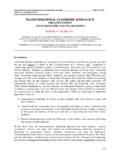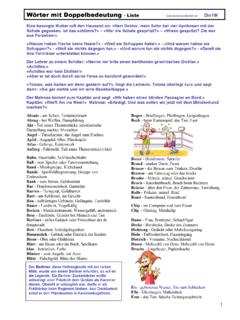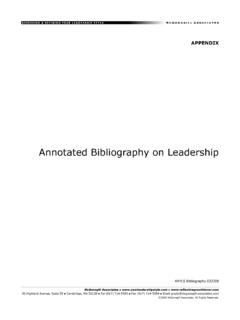Transcription of Peace and Non-Violence Curriculum by Cecil Ramnaraine ...
1 Peace and Non-Violence Curriculum by Cecil Ramnaraine Sponsored by: Minnesota Veterans for Peace , Chapter #27. Social Studies for Grade 12. Grade 12 - Social Studies (can be adapted for grades 7-11). Curriculum Contents I. Teacher's Guide for Peace Non-Violence Curriculum a. Course Description i. Course Content and Weekly Outline 1. Week one: Overview: Poverty as a Form of violence 2. Week two: violence and Conditioning 3. Week three: Non-violent Change 4. Week four: Working Together 5. Week five: Oriental Philosophies 6. Week six: Western Philosophies 7. Week seven: The United Nations 8. Week eight: The Ethics of War and Peace 9. Week nine: The Science of Matter and Energy 10. Week ten: The Problems of Disarmament 11. Week eleven: Economic Conversion 12.
2 Week twelve: One World Beyond War Introduction Recommended Readings a. Student Attitude Survey b. Self Evaluation c. Vocabulary for Feelings Page: 2. Profiles of Peacemakers 1. Mother Teresa of Calcutta 2. Mohandas K. gandhi 3. Martin luther King, Jr. 4. Eleanor Roosevelt. 5. Anwar Sadat. 6. Albert Schweitzer 7. Dag Hammarskjold 8. Franz Jagaerstatter 9. Albert Einstein 10. Dietrich Bonhoeffer 11. Will Rogers 12. Thomas Woodrow Wilson Non-Violent Conflict Resolution and Peer Mediation 1. The Carter Center 2. Peer Mediation Additional Reading 1. Akbar 2. All is One 3. Ashoka 4. Bill of Rights 5. His Holiness Dalai Lama 6. Magna Carta 7. Nelson Mandela 8. Tolerance Page: 3. TEACHER GUIDE FOR Peace Non-Violence Curriculum . AUTHOR: Cecil Ramnaraine .
3 GENERAL GUIDELINES. Suppose that there are 36 students in the class, the teacher may divide the class into 12 groups of 3. students, each group to study 1 peacemaker in detail and teach the entire class about their chosen peacemaker and the concept attached to that particular peacemaker. To be fair, numbers 1 to 12. may be placed in a hat, and the leader of each group shall pick a number from the hat. This will lead to random selection. If any group fails to prepare and teach the class, they may use the provided text for their peacemaker. The weekly Journal of Feelings may be written by students to cover a variety of topics. For example: the week's study; an event occurring at school, in the country, or anywhere else in the world; or any personal problem of importance to that individual student.
4 The student's journal should be treated as privileged communication between the teacher and the student. Thus, the teacher should not discuss any student's writing with anyone else and should only give advice and guidance if asked to do so by the student. In all cases, the teacher should not be judgmental, but deal with the facts of the situation. For grading, it is suggested that the class develop a dozen or more criteria by which each student shall assess himself/herself. Thus, every effort should be made to develop an open, democratic, tolerant, and peaceful class setting. Volunteer work should be done for a minimum of 15 hours per semester. Acceptable volunteer work may include: free babysitting for a needy family; yard work for any handicapped or elderly person; tutoring in the elementary schools; becoming a member of the student council; serving as teacher assistant in any classroom; and free service in a hospital, daycare center, or retirement home.
5 The class may engage in stress reduction exercises, for example: quiet time, meditation, or yoga. Page: 4. SPECIFIC GUIDELINES. Mother Teresa When studying Mother Teresa, the following topics may be explored: housing in the USA and the world; abortion; pro-life; adoption; hunger and starvation in the USA and the world; problems of the clergy in the Roman Catholic dioceses; child abuse; the place of women in the hierarchy;. retention of celibate priests; women priests; gay priests; and gay marriages. Mahatma gandhi Encourage students to tell their own experiences with the different aspects of conditioning in their own lives. Examine the role of violence on TV, video games, movies, etc. and its influence in the behavior of youth and adults.
6 The class may wish to peacefully protest an unjust rule in their school. They may also wish to write letters to the appropriate authorities to point out some particular injustice and suggest remedies. Martin luther King, Jr. The class may discuss the problem of racism and point out some glaring and some subtle racism in their own school. Explore the acceptance of the human race as one race instead of the many divisions into several races. Debate the Second Amendment of the US Constitution and the effect of guns in American society. Compare countries with strict gun control laws ( Canada) vs. countries with loose gun control laws ( USA). Discuss the ethics of governments declaring war and authorizing human beings to kill other human beings.
7 Examine the ethics of the death penalty laws. Eleanor Roosevelt Students share each other's culture and food, especially at the various holidays. Students tell about their volunteer work and how it has helped their growth in cooperation and working together with others. Examine the Americorps (and other local humanitarian groups) as well as the Peace Corps and their benefits to Americans and other countries. Examine how we treat the environment. The question should be asked: whether we can have more industry, mining, logging, manufacturing, etc., and still be able to preserve our environment? What are the effects of global warming? The role of women in our society should be discussed. Do we have equality between men and women in our society?
8 What is the effect of patriarchy in many world societies? Anwar Sadat Learn about the work of Shirin Ebadi who won the 2003 Nobel Peace Prize. Students from different belief systems shall explain their various philosophies. Do these different philosophies have some beliefs in common? Students shall be encouraged to learn a foreign language. Students should learn some foreign sports such as soccer, cricket, etc. Cook and share foods of various countries. Study the causes and effects of terrorism on societies. Albert Schweitzer Examine the pros and cons of missionary societies. Investigate some problems in Africa, such as the AIDS epidemic, and propose solutions. How can a continent so rich in natural resources have so many poor people?
9 Study the problem of ethic and tribal conflict and warfare on these societies, such as the massacre of the Tutsis and the Huttus in Biafra. How can this be avoided in other African nations such as: Liberia, Somalia, Sudan, Zaire, Congo, Nigeria, Zimbabwe, Angola, What are the effects of having a dictatorship rather than a democratically elected government on these African nations? Page: 5. Dag Hammarskjold Study the defects of the United Nations (UN) and suggest its reformation. Should veto power vested in the 5 Permanent Security Council Members be abrogated? Should the Security Council be re-organized to better represent the world's population distribution? Should the Security Council decisions be made by a majority vote rather than by the veto power of any of the 5.
10 Permanent members? Should the UN General Assembly be granted more power over world decisions? Should the UN have a permanent peacekeeping force? Compare the role of the UN in the 1991 Gulf War under Bush I vs. the 2003 Gulf War under Bush II. Discuss the theory of pre- emption and how it changes the relationship between countries with differences. What are the causes of terrorism and how can the UN deal with it? How can one world government operate? Franz Jagerstatter Students shall explain their understanding of ethics and give examples from their own experiences. What is right action'? Is it ethical for a government to declare war and legalize the killing of human beings? Students may study stories of non-violent resolution to conflicts and tell stories of their personal non-violent involvement in solving conflicts.






